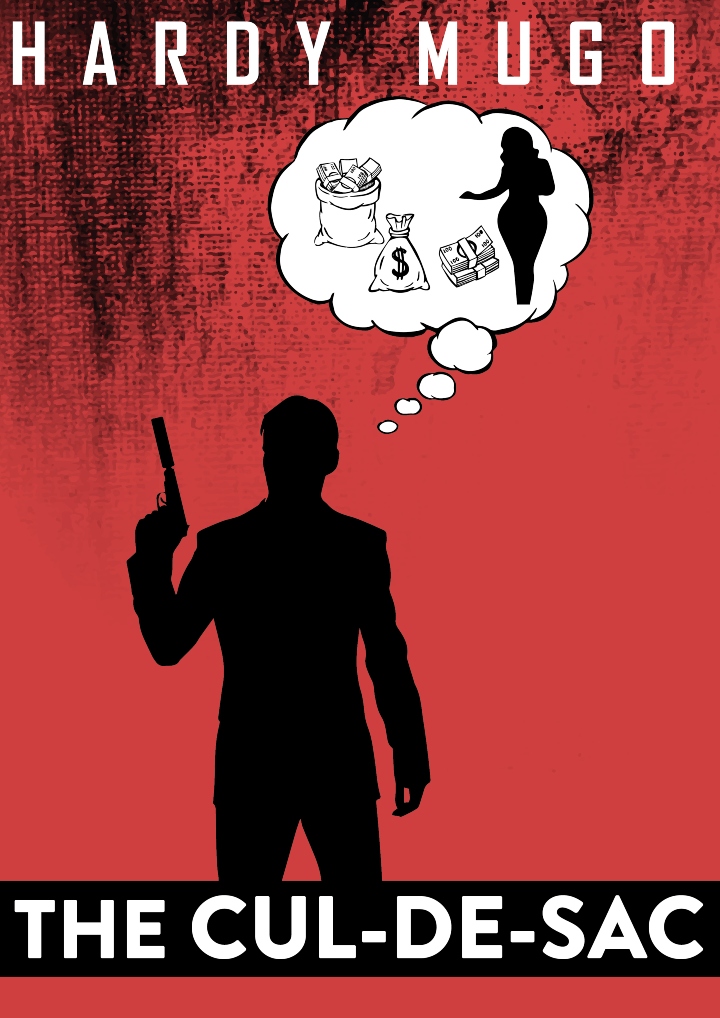CHAPTER TWO
There will be no going to the hospital for treatment. No nothing. I was going to face my challenges head-on. All I wanted was to make money. Quickly.
I wanted to support my aging parents, marry Shillah, and, if there was a surplus, help support good causes in society.
I set out for Nairobi, specifically for Githurai, on the outskirts of Nairobi. My uncle welcomed me warmly. His house was spacious, with several guest rooms.
He offered me one of the guest rooms, which had an ensuite.
Nairobi is the quintessential hustling hub. Over 80% of graduates from all over the country meet in the green city in the sun to look for jobs.
Some get well-paying jobs and in no time buy top-of-the-line vehicles, which they can only afford to fuel from payday to the fifth day of the month.
Some people, after failing to get a job, retreat to the countryside to draw up a second plan, popularly known as “Plan B.”
The more resilient ones stay on regardless. The resilient types are likely to rent a shack in one of the slums and survive on a shoestring budget in the most squalid conditions.
The lucky ones have their parents send them peanuts to cover the basics, while those from poor backgrounds have little option but to fight it out themselves.
As they say, the city is a concrete jungle. Unlike the countryside, where one could retreat to the farm to dig out a few tubers for a meal, the situation is different in Nairobi, where one can almost starve to death before any help comes their way.
How coincidental! I encountered all the scenarios within the first two days in Nairobi.
First, I encountered my old friend from college days, Job Onyango.
We greeted each other warmly, and he eagerly informed me that he was working with the Ministry of Youth in the Nairobi County Government.
Job was a great friend. I call him a great friend, for even though we differed on most political issues, our friendship never wavered.
In fact, most of my college friends thought we had originated from the same high school.
Job was a flamboyant and intelligent friend who would never associate with anyone he deemed to be a “dimwit.”
In fact, once, while having coffee with our girlfriends in my college room, he told me he believed in the mantra: “I don’t believe in what you say, but I will defend to the grave your right to say it.”
“I think we should meet over a njele (calabash) of uji,” he suggested.
“Safi (ok),” I said.
We agreed to meet later in the evening as he was heading for a youth meeting at the Kenyatta International Convention Centre.
By the look of things, he was doing fine, as I learned later in the evening. I noted he even had the audacity to talk about the prospects of buying his first car, a German machine.
On my second day in the city, on Haille Sellasie Avenue, I bumped into Jack Murags. Murags was a great friend during our days on campus.
We had toiled together through university. I say toiling because some of the activities we engaged in to survive the hardship and poverty on campus could only be carried out by people who were determined to go through a difficult process.
Perhaps the most memorable incident was the innovativeness that followed when Jack returned home from campus with a sack of bananas during a hard month.
Thereafter, he had asked for ideas, and I had hatched a “clever” plan. I told him that we could eat the matoke (green bananas) for two weeks.
However, Murags could not figure out how that would be possible. I told him that we would use the mashed matoke as vegetables to “escort the ugali.”
I recall his girlfriend’s perplexed expression after she “caught” us eating the amusing meal of ugali with mashed plantains broth.
As expected, she had gone ahead to publicize the incident to her friends.
Following that, we became a source of amusement for our classmates, who soon followed suit.
Later, when they told us it wasn’t a bad meal after all, we bragged that we had invented the strange meal (which we had nicknamed “Witafix” for its sleep inducing character) in order to help the majority of students survive on campus.
I remember my squad becoming a celebrity of sorts and Jack Murags parting with his girlfriend. That’s life.
“Hey! Ghasia! “Where have you been, you lazy Coastarian?” Murags said as we shook hands vigorously.
“Chacha!” I greeted him back. Murags nearly choked with laughter.
Murags had earned the nickname “Chacha” during one of the graduation ceremonies during our time on campus.
During the open-air reception, where food was plentiful, the chefs doing the serving had set aside one of the sufuria (stainless steel pots) full of chicken broth.
They literally refused to serve students from the Sufuria for reasons unknown to us. But Jack Murags had walked to one of the servers, a matronly lady who was manning the chicken sufuria.
Jack had whispered something into her ears and then pointed in my direction.
Unconsciously, the server had moved away from the sufuria.
A student from nowhere noticed the opportunity, lifted the lid of the sufuria, and scooped chunks of chicken meat.
Soon, hordes of students helped themselves to the delicious pieces of chicken.
From that day on, I nicknamed him Chacha, which meant sparks in street lingo. And the name stuck like glue.
“What have you come to do in Nairobi?”
“To look for a job,” I replied.
Chacha laughed.
“Man! You better wake up from your nightmare. There are no jobs here. I’ve searched for ways to earn a decent living for months with little success.”
“So you’ve been doing nothing?” I posed.
“Yeah. I wonder why people keep saying that “nothing is impossible.” Chacha shot back in obvious good humour.
Chacha disclosed that he had rented a shack in the Mathare slum.
The same evening, I called my uncle and informed him I was spending the night at a friend’s place.
Something deep inside told me that it was inappropriate to begin sleeping outside when my shoes had yet to shed the Coastal dust, but a more persistent voice convinced me that I needed to move quickly.
The slum was a terrible place. I had heard how terrible it was to live in a real slum but hadn’t experienced the harsh realities firsthand.
Inebriated young people in their teens and early twenties seemed to be everywhere.
But nobody seemed to care about them. The chang’aa brewers continued with their business unperturbed.
The cannabis peddlers were also on the loose, each striving to sell as many joints as they could.
“And how do you manage to stay here?” I asked Chacha.
“Why do you ask stupid questions?” “Are you scared?” he posed with feigned seriousness.
Silence ensued before I lost control over my suppressed laughter. Chacha smiled dryly as I awaited my opportunity to hit back.
Chacha’s one-room shelter was a marvel of sorts. The walls were made of cartons.
The roof was made of flattened tin that had been joined together by small nails.
We entered, and Chacha switched on the lights from a switch under his makeshift bed.
“Nice place you have here, degree holder!” I said it in obvious jest.
“Indeed! It’s really great. “I’ve worked hard to be where I am, remember,” he replied with a wry smile.
“C’est la vie,” I replied.
It was now around 7 p.m. at night, and Chacha asked me to stay as he went outside to fetch njahi and chapati for supper.
“I’m not waiting here lest somebody stabs me through these walls in your absence.”
“I see your strange phobias haven’t left you yet.”
“You can say that again,” I replied.
We walked to a group of women selling chapatis and all kinds of beans, including njahi.
Chacha paid for six chapatis and two shares of beans and headed back to the shack.
We ate quietly, though quickly. Thereafter, I asked Chacha if he had any hot water in the room, to which he replied that he neither owned a stove nor a heater.
“Let me fetch a heater from Omosh,” said Chacha as he bolted out of the room.
A while later, he returned with the heater, accompanied by a fellow whom he introduced as Omosh.
“Hey! Omosh meet Mwangi, a good friend of mine,” said Chacha as he introduced us to each other.
“Pleasure,” I said amidst a firm handshake.
“Nice to meet you, Bwana Mwangi,” replied Omosh, smiling.
An uneasy silence ensued in the room before Omosh turned to Chacha and asked.
“Can he work?” I mean, can he join us in the reap?”
Chacha only laughed, politely dismissing Omosh’s remarks as he walked him outside the shack. Once outside, they talked for some time before he walked into the shack.
He immediately connected the heater to a switch located under his bed.
Soon I had a glass of boiling water, to which I added the concoction, which I carried in a small sachet in my pocket.
Chacha just watched as I gurgled down the mixture.
“Now tell me. What did that Omosh guy mean?” I inquired.
Chacha went quiet. He then, as if suddenly mustering enough confidence to talk, came alive.
“Mwangi, I feel I have suffered enough in life,” started Chacha, almost in tears, with his head bowed. I strained my ear to catch more.
“Now, the other day, Omosh came up with a plan that’s likely to get me out of poverty.
He told me of a plan to go for a ‘reap.’ He told me the plan requires four people to take off.
Now there are three of us; his college buddy, him, and myself. “Now, if you don’t mind, I can talk to him tomorrow and see if we can bring you on board,” said Chacha.
I needed no further explanations.
It was as clear as day that the hard hustling in the city had pushed Chacha to the point of getting money by any means possible.
I cursed city life for driving an honest young man like Chacha to the point of joining a wicked gang of robbers.
“Man, has it come to this?” I asked Chacha, who now looked more emboldened than ever.
“Man Must Live,” said Chacha, in reference to the hackneyed slogan and title of the famous short story by Ezekiel Mphahlele.
“And rapper 50 Cent said you either get rich or die trying,” he further asserted.
As a result, I knew he’d made up his mind and that any attempt to persuade him would be futile.
And what’s more, I knew he would inquire about my decision the following day.
What’s more, even if I rejected the idea of joining the gang, it wouldn’t matter.
Chacha would still carry on with his endeavour.
But whether I returned a yes or a no answer, he would remind me that the other guys, Omosh and Omulama, had graduated with honors in electrical engineering.
He would remind me of the many days I took the risk of taking end-of-semester exams without an exam card back on campus, an offense punishable by expulsion.
That night, I didn’t sleep a wink as I had so much going on in my mind. The following morning, my answer was YES.
After all, I thought, if I died, the bullet would only have dispatched me before cancer did.
This short story is protected by copyright. Any unauthorized reproduction or distribution, in whole or in part, is strictly prohibited and may result in legal action.
This includes posting the story online, whether in its original form or in a modified version.
If you wish to share this story with others, please do so by sharing the link to the original publication or by obtaining permission from the author.
Thank you for respecting the author’s intellectual property rights.
THE CUL-DE-SAC: CHAPTER 3






















